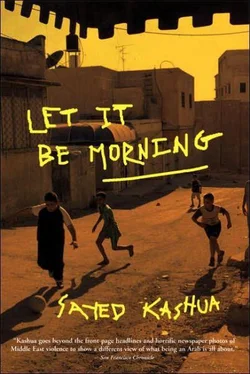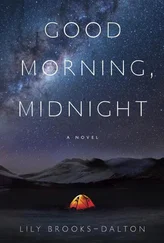I’m ready now. I pick up the baby. According to the weather report at the end of last night’s evening news, it’s going to be warmer than usual today. My wife sighs. As far as I’m concerned, it doesn’t really matter. First we’ll stop at the nursery where we’ve begun leaving the baby. Every morning when we hand her over she cries, and we’re both kind of sad because of it, but we have no choice. My wife has to go to work, and for now at least, so do I. Then I’ll take my wife to the elementary school where she teaches. We’ll say good-bye, she’ll ask when I’m coming home and I’ll say I can’t tell because it depends on what happens today. Sometimes, when there’s a terrorist attack or a major military operation, I stay out longer and walk around because it’s only logical that a deputy news editor would be busy on days like that. I hope nothing out of the ordinary happens today. Sometimes those aimless amblings in the city streets are extremely awkward. I try not to walk the same streets twice, to keep changing locations. It isn’t only my family and the people in the village that I’m ashamed of facing because I’ve lost my job, but strangers too — kiosk owners or people in the café that I’ve never even met. So I try not to pass by them too often, because I don’t want them to think of me as a loafer.
I turn on the car radio and decide I’ve got to put an end to it, to the disgrace of it. Things can’t go on this way. If another week goes by without my finding a new job, I’ll have no choice but to go to the Unemployment Office and apply for benefits. Nobody needs to know yet. I could go on leaving the village every morning. I’ll go to an office far away where they don’t have any Arabs at all.
Something’s wrong. At this hour, the cars are all supposed to be heading out of the village to work, but they’re driving in, and some of the drivers coming toward me are flashing their brights. Right away, I check if my seat belt’s fastened. Flashing brights mean there’s a police roadblock at the exit.
The closer I get to the main road out of the village, in the direction of the nearby Jewish moshavim and kibbutzim and, beyond them, the cities, the heavier the traffic. Drivers are honking nervously, trying to turn around and creating a traffic jam. I manage to find a spot to park the car on the shoulder, get out and quickly march toward the exit, where hundreds of people have gathered. “Is it true?” asks a young man who’s also hurrying in the same direction.
“Is what true?”
“That they’ve sealed off the village?”
I don’t know how to react. I try not to laugh in his face, try not to seem like a know-it-all. “We’ll find out soon enough,” I say, and add, “Allah yustur,” to make sure I sound like I belong. With every second that goes by, the crowd at the exit just keeps growing. Mostly they look disgruntled, and worried about the day’s wages they’re about to lose. I recognize many of the faces and realize that some of them are people I know personally.
“What’s happening?” some of the people I know ask, turning to me. I’m the journalist in this village, after all, and they’re hoping I might have some idea of what’s going on. I shrug. Inching my way to the front of the crowd, I make out remarks like, “All the exits are blocked,” “Some people tried to make it by the dirt roads, the ones the tractors use, but they couldn’t get through,” and a story about one of the workers who tried to approach the soldiers and took a bullet. They say the bullet was shot with intent to kill, because his arm was right above his chest when he was hit. As I get closer, I notice that two tanks are blocking the road about five hundred feet away from the crowd, and aiming their enormous barrels at the people below. Everyone turns in the direction of the tanks, the jeeps and the soldiers, except for the mayor, who stands there with his back to the soldiers, facing the villagers and begging them to stay back. The mayor keeps explaining that he found out about the blockade only that morning and he has already called the people in charge, who promised to get back to him and to take care of it at once. He goes on to say that there must have been some mistake, urges the crowd to be patient, to wait a while till it all blows over. “You’ll make it to work today,” he promises. “Just give me a chance to find out what’s happening.”
“The soldiers must have confused us with Tul-Karm,” someone blurts out, and manages to elicit some laughter. Many rolls of barbed wire are blocking the road. I look in either direction and discover that they stretch as far as the eye can see. Someone in the crowd swears that the wire runs around the entire village, and wonders just when the soldiers had a chance to roll out so much. In the distance we see that besides the tanks blocking the road there are others scattered in the fields, evenly spaced on either side of the road. The tanks are still, but their engines are running, giving off billows of smoke every now and then as the roar of the engines grows louder.
What’s going on here damn it? We’ve had roadblocks at the entrance and exit of the village almost every morning, but this is something altogether different. This new turn of events scares me at first, then makes me happy for a few minutes. I’ll finally have a good story, I think. When’s the last time they used tanks against Arab citizens? A story like that even has a chance of being printed on the front page and, who knows, maybe it will lead to my being invited for a radio interview, like in the good days. I’m right on the spot, after all, in the heart of the story — a journalist and a resident of the besieged village. I might even get asked to appear on TV. I’ve been on a few current-events programs, to the delight of my family and friends, even my in-laws. I’ve always enjoyed it when one of the research assistants asked me to come to the studio. I enjoyed how they’d send a cab to pick me up, I enjoyed dressing nicely and getting made up. It was usually just one of the morning or late-night shows, but still, my TV moments were the best I’d known. Maybe these tanks would bring them back.
I work my way back out through the front rows of the crowd, trying to move away so I can update one of my editors about what’s going on. The way back into the village is becoming more and more jammed. All those who’d tried to get to work through the side roads are making their way back now that they’ve realized all the roads are subject to the same fate. There’s no doubt about it now: the village is blocked off on all sides.
I left my mobile in my briefcase in the car. I glance at my watch and see it’s almost eight. I step up my pace so I can catch the morning news on my car radio before phoning the news desk at the paper. There’s no more honking or bottlenecks now. Apparently the news has spread. People have parked in the middle of the road. Where can they go anyway?
The news makes no mention of what’s happening in the village. They talk about cities on the West Bank, cabinet meetings, the rising exchange rate of the dollar, but nothing to do with Israeli Arabs. Maybe it’s a mistake after all, as the mayor said, I think as I dial the paper. But luckily for me, even a mistake like that is still a story, for the back page, maybe, where they put the most amusing items.
The switchboard operator is nice as she takes my call. She says good morning, asks how the baby’s doing and only then lets me know that the editor-in-chief hasn’t arrived yet. I decide to phone him on his mobile. I was one of the paper’s senior writers until not long ago, after all, and the events in this village are an emergency situation. The editor answers from his car. He sounds surprised at what I tell him, and tries to see if I’m not pulling his leg. “Tanks? Bulldozers? Are you kidding?” he says with a laugh.
Читать дальше












